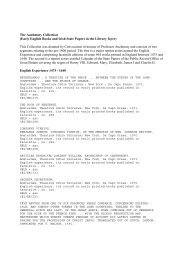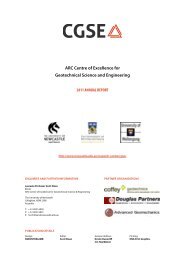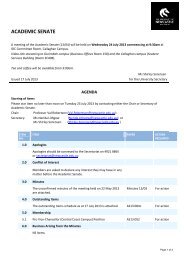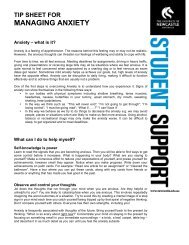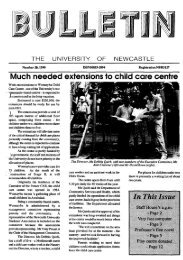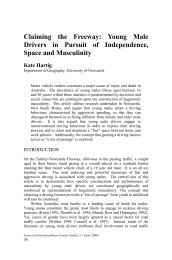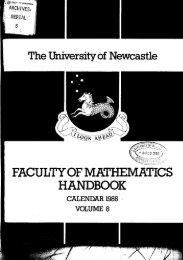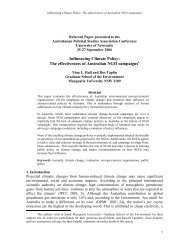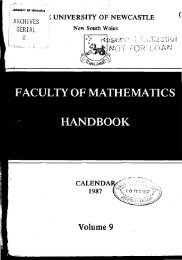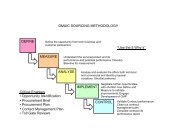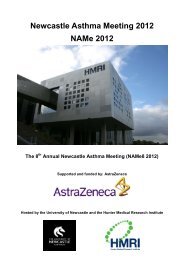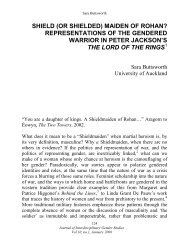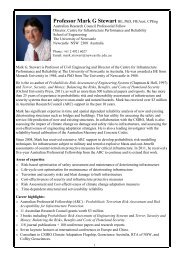n - University of Newcastle
n - University of Newcastle
n - University of Newcastle
You also want an ePaper? Increase the reach of your titles
YUMPU automatically turns print PDFs into web optimized ePapers that Google loves.
92 LT AUSTRALTAX L~GUABE.<br />
Ana7ysis.-1. Pitil* is 'joy, peace, delight'; bali is the dual<br />
pronoun, ' we two'; kakillbn, which is the verb 'to be' in state<br />
<strong>of</strong> continuation, consists <strong>of</strong> three parts-ka, the root <strong>of</strong> the verb<br />
'to be, to exist'; -hi, the sign <strong>of</strong> the infinitive, -]in, the sign <strong>of</strong><br />
continuation at the present time.<br />
The negative form <strong>of</strong> this exan~ple would be keawaran bal:<br />
pita1 korien, 'we do not love one another,' or 'we donot agree<br />
the one with the other.' Here k ea waran is the denial in the<br />
present tense, from keamai, the negative infinitive; the imperatirenegative<br />
is kora; as,pital b611 kora, 'do not be peaceable',<br />
where b&n is the present tense <strong>of</strong> the verb 'to be doing';<br />
the last 11-ord, lrorien, in the aboriginal sentence, is the negative<br />
adverb 'not'; thus, in this sentence there are ftvo negatives, both<br />
<strong>of</strong> mhich are essential to express the negation.<br />
2. The aboriginal phrase bfinnhnbanug, 'I shall sinite thee,'<br />
shows at once the similarity <strong>of</strong> collstruction <strong>of</strong> this Australian<br />
language rrith that <strong>of</strong> the Indians <strong>of</strong> America ; for, though I<br />
map mite it sqarately, as bfinnh 11 ban u g, because I know the<br />
words to be the verb and the conjoined dual proooun, yet it is<br />
pronounced as one ~~ord, and nould be so considered by a<br />
stranger. If 'cletermination' is to be expressed, the particle ma1<br />
must be inserted; aq, bbanun wa1 banug, '1 shall and will<br />
smite thee'; this mould be thus analgsed :-b6n, the root <strong>of</strong> the<br />
verb 'to smite'; -nu 11, the particle denoting futurity; wal denotes<br />
determination ; ba, is part <strong>of</strong> the vrrbal pronoiin bag, 'I,, while<br />
the personal pronoun is gatoa, ' 1'; b i is the verbal pronoun<br />
' thou'; -11ug is the pronoun ' him' ill the objective case; and the<br />
termination -noun in the next example is part <strong>of</strong> bo unnoun,<br />
the feminii~e proilonn 'her,' in the objecti7-e case. Thus, our<br />
blacks carry out the dual beyond any know^^ language in the<br />
world, IT-hether ancient or modern ; and they also conlplete their<br />
dual by carrying it out to the feminine in the conjoined dual<br />
ease, which the American Indians do not in the " second personal<br />
f oi-m."<br />
Nug is pronouuced n68 when applied to a person, but nhg<br />
when applied to a thing. So likenike, bGn, 'to smite,' is accented,<br />
and is pronounced like the English word boon, 'a gift'; but bun,<br />
'to permit to be,' is unaccented, and rhymes with the English<br />
n-ord bun, 'a little cake.'<br />
Our blacks say xai ta bal i for ' I go with thee,' or ' we two<br />
go now together'; but maita bag would mean 'I go by myself';<br />
waits bali noa, 'he and Igo together'; waita bali bountoa,<br />
'she and I go together'; to say ' I go,' emphatically, meaning no<br />
other but myself, would be gatoa waita urn anun; whichwould<br />
be construed thus :-ga ton is the personal pronoun 'I' ; waita<br />
* Pita1 in this language is the nearest mord to express love.<br />
THE KEY. 03<br />
is 'to go or depart '; n TT ink n is the future tense <strong>of</strong> the ~erb <strong>of</strong><br />
motion, to come' or 'to go,' according as the vord wai ta, 'to go,'<br />
or tanan, ' to come,' is attached to it. The Tahitians hare a<br />
similarity <strong>of</strong> formin the expression haere, 'to come ' or 'to go,'<br />
according as the particle m ai or at u is attached ; thus, h aere<br />
mai, Lc~me,' haere atu, 'go.'<br />
Mr. Elliot,inhis Grammar, shorrs that the 35afsachusetts dialect<br />
hss numerous conjugations <strong>of</strong> its verbs ; and 4Ir. Reisberger has<br />
divided the Delaware language into eight conjugatioils <strong>of</strong> rerbs.<br />
In illy Gramnar, also, 1 hare traced out eight modifications <strong>of</strong><br />
the Australian verb as spoken at Lake Macqnarie ; and its tenses<br />
arenot confined simply to the past, present, and future, but have<br />
various modifications <strong>of</strong> each time; for installee, they have a<br />
present with the termination -bn for theverb, and -1in for the participle;<br />
aR, wiy-in bag, ' I speak' now; aipel-lin, 'speaking'<br />
now; a definite past tense has the particle -IiB~ a; as, mi y a-k 6k 11,<br />
' have spoken' this mori~ing ; nriy -ell i-lii.in, 'have beell spenking<br />
' this morning ; and an iudefiuite past is wipa, 'told or spolie',<br />
and wi y elli-ela, 'spalie,' both terminatingin CL. There are three<br />
~arieties <strong>of</strong> the future; as, mi? elli koleg, 'to be about to speak';<br />
where wiyelli is the bare form <strong>of</strong> the infinitive ~viyellilio,<br />
' to speak,' and k o 1 a g is ' towards '; then there is also a definite<br />
future ; as, wiya-liin, 'shall ora will speak' to-morrox morllii~g ;<br />
and besides, an indefinite future, mi7 a ~lu n, ' shall o+ mill speak '<br />
wme time or other. Thess peculiar tenses are not noticed ii~ the<br />
Indian Grammars, and, therefore, it is presumed that they are<br />
peculiar to the languages <strong>of</strong> the aborigines ol this land.<br />
The South SeaIslanders make no change in the endings <strong>of</strong> the<br />
verb; neither do the aborigines <strong>of</strong> Australia; for each tense-form<br />
<strong>of</strong> the verb map be nlade available to any person, according to the<br />
pronoun substituted. The chance <strong>of</strong> person is seen only in the<br />
English translation, and not in the Australian mord ; thus, from<br />
wiy elliko, 'to speak,' 'to communicate by speech or sound'applied<br />
to the speech <strong>of</strong> man, the crowing <strong>of</strong> a cock, or the<br />
striking <strong>of</strong> a clock--come wiy in bag, 'I speak'; nri y An bi, ' thou<br />
speakest'; wiyinnoa, 'he speaks'; miyin bountoa, 'she<br />
speaks'; wiyin gali, 'this speaks'; wigin ghen, 'we speak';<br />
wiyin banug, 'I speak to thee'; miyiLn bali bulun, 'we two<br />
speak to you two '; wiyellin bag, 'I am speaking'; wiyellin<br />
banug, 'I am speaking to thee'; wipellbn bag, 'I spenk<br />
and continue to speak,' 'I tell '; wiyellbn banug, '1 tell cc<br />
thee'; wiyellin bali, 'me two tell one another,' 'we converse';<br />
miyellilin bag, ' I am speaking and continue to speak,' 'I<br />
am talk~ng '; wiyin gali- ko clock-ko, 'the clock strikes.'<br />
Muk-kg-kg tibbin-to wiyin, 'the cock crows'; here mukkZki<br />
is the nearest sound to express the cackling <strong>of</strong> fowls;<br />
literally the sentence is, 'the bird says mukkgki.'



